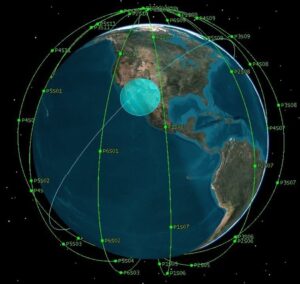Iridium will design a small satellite payload to be hosted by an unspecified constellation in low Earth orbit.
The payload is intended to support military users who rely on GPS signals for positioning, navigation and timing.
Matt Desch, CEO of Iridium, said the project is likely to take at least three years. He said the company will develop a concept based on the “Iridium Burst” service that can transmit data to thousands of enabled devices from Iridium’s network of 66 satellites in low Earth orbit.
The contract is an “other transaction agreement” awarded by the Aviation and Missile Technology Consortium on behalf of the Army.
“It’s a bit of a science project, if you will,” Desch told SpaceNews.
Iridium will be working with two major subcontractors: Satelles and SEAKR.
Satelles broadcasts timing and location signals via Iridium’s L-band constellation. The service is offered as an alternative or backup to GPS.
Desch said Satelles’ technology will help support the Army project.
“It’s the idea of sending timing information through a LEO system,” he said.
This contract is not about providing an Iridium-based service, Desch added. “We might develop new capabilities that can be exploited in other ways and then turn into a product, but that isn’t really what this is.”
“The focus is to really explore how services that they get from a network like this can be proliferated between multiple kinds of LEO networks,” he said. “That’s an interesting idea and it’s one that we obviously are excited about seeing how it works.”
The Army wants a concept that could operate in any LEO network, he said. “I don’t think they’re picking winners at this point, they’re very interested in LEO for obvious reasons.”
Desch said there is a growing “ecosystem of capabilities” in the industry for the delivery of positioning and timing services from low Earth orbit.
Besides Satelles, Iridium also invested in DDK Positioning, which offers positioning data services using Iridium’s network.



